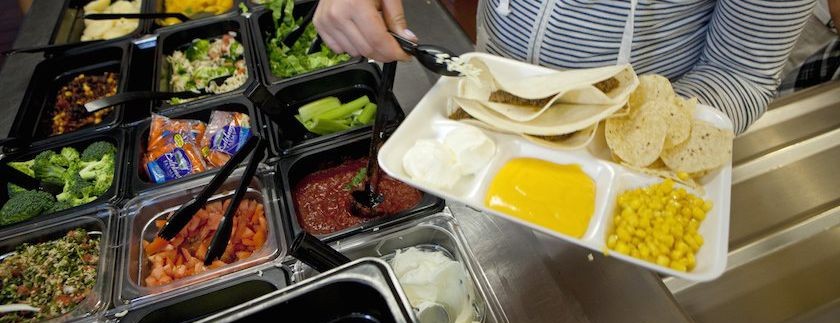News



How foodpreneurs are reinventing your kid’s school lunch
Fortune | Posted: 06/19/2015
View original article here.
[ssba]
Press Release



How foodpreneurs are reinventing your kid’s school lunch
Posted: 06/19/2015
The future of food is not engineered to guarantee a quick meal. Rather, its authentic, natural and sustainably grown. Last week, co-founder and former chief executive officer and chairman of America Online Steve Case posted a pointed take down on Re/Code challenging the ambitions behind the uber-hyped Soylent powder drink and other food impersonators as misguided. With #ByteSV behind us and Fortune’s special report on the war on big food resonating through industry’s hallways, his comments are right on time. Steve gently tries to steer the elitist course of some techpreneurs who are flooding into the food business toward a healthier and more responsible course of imagination and innovation. Steve’s article reminds us that food (and the experience of food) is not a technical construct to be engineered and optimized, but rather a precious and spiritual community resource that needs to be cultivated and grown, with patience, care and responsibility. Like Steve, I too, have put my time and money where my mouth is when it comes to investing in keeping people healthy. The venture capital firm I co-founded, Physic Ventures, has backed a number of companies focused on seizing large, new market opportunities that are ripe for reinvention at the intersection of personal and planetary health. The investment of which I am most proud is Revolution Foods, (which Steve features and is a fellow investor), the nation’s leading purveyor of healthy school meals and family friendly foods. I have had the privilege of working closely with the founders of Revolution Foods, Kristin Richmond and Kirsten Tobey, since their MBA days at UC Berkeley. (They crafted the RF plan in my social entrepreneurship classes that focus on designing “both-and” businesses—those that generate financial returns and positive social impact.) The vision for their business sprung from a deep commitment and clear intention to reach children with tasty, healthy and affordable meals at school. (The U.S. school lunch market is estimated to be $20 billion annually). The food business, where there is limited patentable intellectual property, is not necessarily tough to get into, yet the challenges to grow a business in the food industry are uniquely complex and demands capital and operational mastery. Revolution Foods has grown steadily and thoughtfully from one charter school in Oakland California (nine years ago) to now serving more than 1000 schools more than 1.5 million meals per week in 15 states. But Revolution Foods is neither an overnight success nor a VC “unicorn”. It is however, a very valuable business with a focused purpose, a solid, long-term value proposition and a clear conscience. Revolution Foods produces fresh, healthy meals. (Kids are involved in the creation of recipes that are refined by culinary experts.) Vegetables are introduced in creative ways; students learn about the foods they eat, where they come from and why they are important to their well-being. The RF offering is wholly distinct from the highly processed and commercial fast foods that have filled a staggering number of school cafeterias during the past two decades. Like legendary foodpreneurs before them (such as Gary Hirshberg, Greg Steltenpohl and John Mackey), Kristin and Kirsten have built unfair competitive advantage by operationalizing the core values of their business through their company’s culture. They have thought and led holistically with a systems-mindset. During the past eight years, Rev Foods has created well over 1,500 new jobs, many in economically challenged communities, including Oakland, New Orleans and Elizabeth, New Jersey. It has designed an environmentally responsible and defensible supply chain. Most importantly, the company’s leadership has re-imagined breakfast, lunch and dinner, while delivering chef-crafted, kid inspired nutrition-rich dishes that are transforming the health and habits of a generation of children—the very ones we need to adopt and lead the food revolution for the next 50 years. With the company’s recent and successful entry into the retail grocery channel, Revolution Foods is reaching an even broader national constituent of families seeking healthy and affordable meal options. It’s exciting to see so many young leaders and managers aspiring to join the food business. (As a matter of fact, Berkeley Haas and The Food Business School will offer a dedicated Food Venture Lab this fall because there are so many students interested in pursuing the sector.) It’s also interesting to see so many techies reinventing themselves as foodpreneurs — and I join Steve in emphasizing that food requires a different mindset and playbook than tech. Food entrepreneurs would be well served to envision themselves as stewards, rather than hackers or disrupters. Foodpreneurs by nature have a responsibility to a broad ecosystem of stakeholders — from their customers’ guts and taste buds to the producers who grow real food and bring it to market. Some food leaders are even becoming externally accountable to the system of natural capital in which their products are produced—including the vital assets of healthy soil and clean air and water—with transparent reporting of their supply chains, labor practices and ingredients. Stewards also manage short-term expectations within a long-term perspective. Transforming a system as complex as food will take a generation. Stewards grow their businesses to last and do so in a way that they are able to not only mitigate the harmful side effects of business as usual (think industrial agriculture and highly-processed foods) but to also generate positive social and environmental returns. There may soon be scientific evidence to suggest that children who eat healthier lunches are less likely to become obese or diabetic (surprise!). Who knows, it may turn out that these kids actually perform better in school (and life) too! That’s what I call return on investment. Will Rosenzweig was founding CEO of The Republic of Tea and co-author of a book of the same name. He is a social impact fellow at Berkeley Haas and was recently named Dean of The Food Business School — the center for executive and graduate education at The Culinary Institute of America.[ssba]



